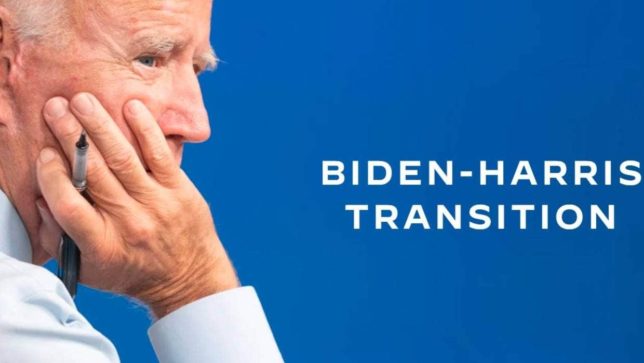Commentary
Biden Transition Illustrates the Need for Foreign-Funding Transparency
 Credit: buildbackbetter.gov.
Credit: buildbackbetter.gov.

As President-elect Joe Biden begins the transition process, much media attention has been paid to his Cabinet nominees. Less has focused on the hundreds of individuals selected for his dozens of Agency Review Teams and how they may ultimately influence the character and priorities of his administration.
As Politico noted in November, Agency Review Teams provide “the most thorough look to date on what the Biden administration will look like. Members of review teams often end up taking jobs at the agencies they are assigned to and will influence who the Biden administration eventually hires.”
Accordingly, the Capital Research Center has begun tracking these appointments to make learning about and analyzing exactly who is involved in the budding Biden presidency an easier and more transparent task. One of a number of patterns that stands out is just how many Agency Review Team members are, or have been, affiliated with the nonprofit sector. The CRC’s Michael Hartmann recently noted many connections to “left-of-center philanthropic foundations or grant-making entities.”
Another recent article from Forbes called “the prominence of college faculty and researchers” on the Biden transition teams a “striking characteristic.” It noted that five of the teams are led by college faculty or administrators, and many of the teams “have more than 20 members drawn from think tanks, state government, non-profits and private foundations.”
The Forbes report continues: “According to one count by Inside Higher Education, ‘Of the nearly 600 mostly volunteers announced by Biden’s transition team to serve on agency review teams to help coordinate the transition from the Trump administration, nearly 80 are professors.’ And that number underestimates higher education’s influence, given that many other appointees had previously held university posts prior to their current, listed appointments.”
And that world, as the CRC has covered here and here, has been shown to be worryingly vulnerable to foreign infiltration and influence, particularly from China, and has of late not been the best about meeting federal transparency and reporting requirements with respect to foreign funding, to put it mildly.
As the CRC has detailed and described at length, the State Department issued a press release on Oct. 13 requesting that “think tanks and other foreign policy organizations” publicly disclose any funding that they receive from foreign governments and state-owned enterprises. While not explicitly requiring donor disclosure, the department noted that it “will … be mindful of whether disclosure has been made and of specific funding sources” when deciding whether and how to work with a given organization.
Then, there were the recent investigations by the Department of Education showing a disturbing rate of noncompliance with federal laws requiring that universities disclose their foreign funding. Under Section 117 of the Higher Education Act, Title IV-eligible schools must report foreign gifts and contracts in excess of $250,000. These investigations reportedly identified a “massive failure of many colleges and universities to disclose more than $6.5 billion in funding and resources from foreign sources.” Yale University, for example, had failed to report even one foreign gift or contract from 2014 through 2017.
What does this have to do with a Biden administration? Transparency from nonprofit groups such as universities and think tanks as to their foreign financial dealings, while appropriately balancing important privacy considerations, should continue to be a priority no matter which party occupies the White House. This is especially true when evidence suggests those nonprofit organizations could be very influential in the coming administration.
Indeed, it’s an issue with genuine national security implications. Recent and repeated high-profile arrests of foreign agents accused of infiltrating America’s research universities demonstrate the vulnerability. As noted earlier this year by NBC News, U.S. intelligence officials have been warning that our “university system has become a soft target in the global espionage war with China.” In May, Congressman Michael Waltz wrote of “China’s mass infiltration and theft of American research at our colleges and universities.”
None of this, of course, is to suggest any wrongdoing on the part of anyone on Biden’s Agency Review Teams or to imply they personally represent a counterintelligence vulnerability, but rather to point out that the nonprofit sector writ large appears headed for a prominent role in shaping the next four years of American government while that sector simultaneously remains unsettlingly liable to infiltration by malevolent foreign state actors.
The Trump administration had been signaling its understanding of this problem in earnest throughout 2020, and legislative proposals designed to enhance transparency and security have been encouragingly bipartisan. As the Biden administration will hopefully recognize and prioritize, the more influence that universities, think tanks, and other nonprofit groups exert over the government, the more safeguards must be in place to ensure their security from hostile foreign influence.
This article first appeared in the Washington Examiner on December 15, 2020.


